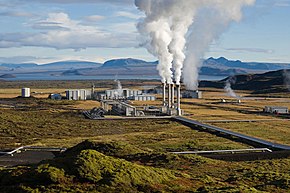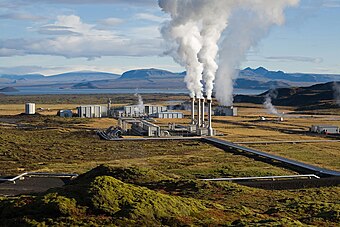Portal:Renewable energy
Introduction Renewable energy (or green energy, low-carbon energy) is energy from renewable natural resources that are replenished on a human timescale. Mainstream renewable energy options include solar energy, wind power, hydropower, bioenergy and geothermal power. Renewable energy installations can be large or small. They are suited for urban as well as rural areas. Renewable energy is often deployed together with further electrification. This has several benefits: electricity can move heat or objects efficiently, and is clean at the point of consumption. Variable renewable energy sources are those that are not dispatchable due to their fluctuating nature, such as wind power and solar power. In contrast, controllable renewable energy sources include dammed hydroelectricity, bioenergy, or geothermal power. Using renewable energy and energy efficiency technologies is resulting in more energy security, climate change mitigation, and economic benefits. From 2011 to 2021, renewable energy grew from 20% to 28% of global electricity supply. Use of fossil energy shrank from 68% to 62%, and nuclear from 12% to 10%. The share of hydropower decreased from 16% to 15% while power from sun and wind increased from 2% to 10%. Biomass and geothermal energy grew from 2% to 3%. Renewable energy systems are rapidly becoming more efficient and cheaper. As a result, their share of the global energy consumption is increasing. A large majority of worldwide newly installed electricity capacity is now renewable. In most countries, photovoltaic solar or onshore wind are the cheapest new-build electricity. Renewable energy can help reduce energy poverty in rural and and remote areas of developing countries, where lack of energy access is often hindering economic development. Many countries around the world already have renewable energy contributing more than 20% of their total energy supply. Some countries generate over half their electricity from renewables. A few countries generate all their electricity from renewable energy. National renewable energy markets are projected to continue to grow strongly in the 2020s and beyond. According to the IEA, to achieve net zero emissions by 2050, 90% of global electricity generation will need to be produced from renewable sources. Renewable energy resources exist all over the world. This is in contrast to fossil fuels resources which are concentrated in a limited number of countries. However, the deployment of renewable energy is being hindered by massive fossil fuel subsidies. In 2022 the International Energy Agency requested all countries to reduce their policy, regulatory, permitting and financing obstacles for renewables. This would increase the chances of the world reaching net zero carbon emissions by 2050. There are ongoing debates around the renewable energy topic. For example, whether nuclear power should be grouped under the renewable energy category or not. There are also debates around geopolitics, the metal and mineral extraction needed for solar panels and batteries, possible installations in conservation areas and the need to recycle solar panels. Although most renewable energy sources are sustainable, some are not. For example, some biomass sources are unsustainable at current rates of exploitation. There are also other renewable energy technologies that are still under development, for example enhanced geothermal systems, concentrated solar power, cellulosic ethanol, and marine energy. (Full article...) Selected article - Geothermal energy is thermal energy extracted from the Earth's crust. It combines energy from the formation of the planet and from radioactive decay. Geothermal energy has been exploited as a source of heat and/or electric power for millennia. Geothermal heating, using water from hot springs, for example, has been used for bathing since Paleolithic times and for space heating since Roman times. Geothermal power, (generation of electricity from geothermal energy), has been used since the 20th century. Unlike wind and solar energy, geothermal plants produce power at a constant rate, without regard to weather conditions. Geothermal resources are theoretically more than adequate to supply humanity's energy needs. Most extraction occurs in areas near tectonic plate boundaries. The cost of generating geothermal power decreased by 25% during the 1980s and 1990s. Technological advances continued to reduce costs and thereby expand the amount of viable resources. In 2021, the US Department of Energy estimated that power from a plant "built today" costs about $0.05/kWh. (Full article...)Quotations -
– Christopher Flavin in REN21 (2010). Renewables 2010 Global Status Report p. 53. Main topicsRenewable energy sourcesGeneralRenewable energy commercialization · Smart grid · Timeline of sustainable energy research 2020–present Renewable energy by countryList of countries by electricity production from renewable sources
WikiProjectsWikiProjects connected with renewable energy: Selected image -Selected biography -Hermann Scheer (29 April 1944 – 14 October 2010) was a Social Democrat member of the German Bundestag (parliament), President of Eurosolar (European Association for Renewable Energy) and General Chairman of the World Council for Renewable Energy. In 1999, Scheer was awarded the Right Livelihood Award for his "indefatigable work for the promotion of solar energy worldwide". Scheer believed that the continuation of current patterns of energy supply and use would be environmentally, socially, economically, and politically damaging, with renewable energy being the only realistic alternative. Scheer had concluded that it is technically and environmentally feasible to harness enough solar radiation to achieve a total replacement of the foclear (fossil/nuclear) energy system by a global renewable energy economy. The main obstacle to such a change is seen to be political, not technical or economic. In 1999 he was one of the initiators of the German feed-in tariffs that were the major source of the rise of renewable energies in Germany during the following years. (Full article...)Did you know? -... that the Exelon Pavilions, a set of four solar energy generating structures in Millennium Park of Chicago, provide sufficient energy to power the equivalent of 14 star-rated energy-efficient houses in Chicago ? In addition to producing energy, three of the four pavilions provide access to the park's below ground parking garages and the fourth serves as the park's welcoming center. Exelon, a company that generates the electricity transmitted by its subsidiary Commonwealth Edison, donated approximately $5–6 million for the Pavilions. General images -The following are images from various renewable energy-related articles on Wikipedia.
Related portalsCategoriesAssociated WikimediaThe following Wikimedia Foundation sister projects provide more on this subject:
Discover Wikipedia using portals |



































![Image 34Concentrated solar panels are getting a power boost. Pacific Northwest National Laboratory (PNNL) will be testing a new concentrated solar power system – one that can help natural gas power plants reduce their fuel usage by up to 20 percent.[needs update] (from Solar energy)](http://upload.wikimedia.org/wikipedia/commons/thumb/8/82/Photo_of_the_Week-_Boosting_Solar_Technology_%288722948189%29.jpg/120px-Photo_of_the_Week-_Boosting_Solar_Technology_%288722948189%29.jpg)














































